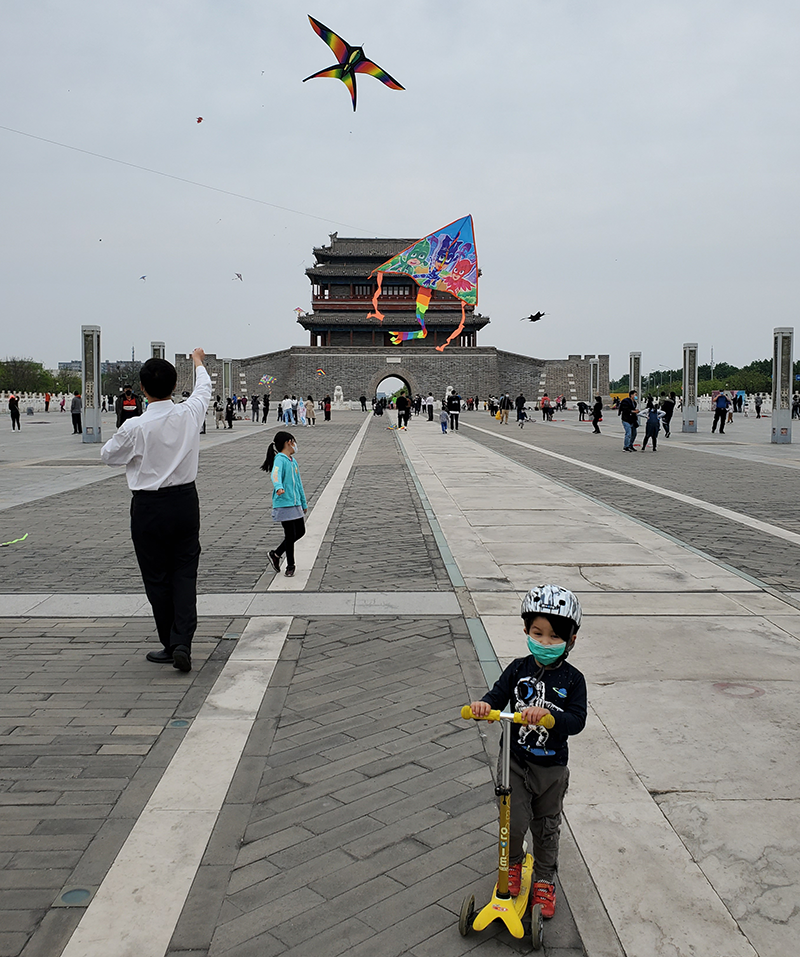Letters to the Editor—April 27, 2020
Each week, Physics and APS News are selecting letters from physicists about their experiences during the pandemic. If you have a story to share, write to physics@aps.org.
Turning the Kitchen into a Lab
The current stay-at-home orders can heavily curb scientific progress. Fortunately, as a fluid mechanician, I have a lot worth studying in my kitchen. I can see capillary instabilities when letting water drip from the tap, or I can watch liquid flow through porous media when making an espresso. Observations like these can potentially lead to new discoveries in physics. For example, when a jet of water hits a surface, it will first spread out in a thin disk and then suddenly “jump.” In 2018, researchers studying such hydraulic jumps showed that gravity doesn’t play an important role, dispelling a more than 100-year-old misconception. And last month, a group found that the formation of “tears” of wine on a glass involves a shock wave, showing that the usual explanation for the tears (the Marangoni effect) was incomplete (see Synopsis: Why My Wine Glass Cries).
“Kitchen flows” are tightly linked to engineering applications. For example, the capillary breakup of a water jet into drops is the basis for creating monodisperse droplets in microfluidic devices. And when making espresso, failure to control foaming (the crema) leads to a bitter taste; similarly, failure to control foaming in lubricating oils can harm machinery. So there is a lot to learn from kitchen fluid dynamics. By performing simple experiments and analyzing our observations, we can prepare ourselves for returning to the lab.
– Endre Joachim Mossige is a postdoctoral research fellow in the Department of Chemical Engineering at the University of California, Santa Barbara.
A Home Office in the Open Air
My family and I returned to Beijing in late March after the COVID-19 pandemic cut short my academic visit in Canada. Following a mandatory 14-day quarantine, we found that life had taken on a new texture: supermarkets demanded a signature upon entry, pedestrians’ phones were subject to scans, and security personnel turned hikers away from the trails in Beijing’s mountainous exurbs. But the biggest change has been availability of child care: daycare centers will remain closed for the foreseeable future. Having failed to live up to Isaac Newton’s unencumbered ideal, we now have to reconcile our academic lives with caring for our child 24 hours a day, seven days a week.
Doing work at home with a three-year-old is borderline unrealistic. The solution that has worked best is peripatetic work: taking a notebook and computer to a large public space and letting our child play outside. We are lucky that Beijing has many beautiful open spaces, which have seen winds of history even greater than the current pandemic. Just yesterday I worked in the shade of the restored Ming Dynasty gate Yongdingmen, while my three-year-old—donning a mask—rode his scooter. Dozens of kites filled the sky above the gate as walkers took care to obey distancing guidelines. Cautious optimism filled the air, and I pushed ahead with my calculation.
– Bartlomiej Czech is a Member of the Institute for Advanced Study at Tsinghua University, Beijing.
Life is Hectic in New Ways
These unexpected changes have brought a bit of everything. People helping, sharing, listening, working, planning, thinking, worrying, celebrating, but all with a touch of optimism. Everyone is doing their best and trying to contribute. Staff and students across my university’s campus have volunteered to help the frontline medical staff at our local hospital. They have made hand sanitizer, donated personal protective equipment from the labs, and pooled their expertise toward making any possible advance to fight the pandemic.
The adjustment to a new work-life balance requires steely determination. As a single mother and an academic leading a research group, life is still hectic but in a different way. The days are a mixture between strictly on-time online meetings and impromptu discussions—sometimes serious, sometimes lighthearted. I continue to supervise my students and the team. In parallel, home schooling my 12-year-old daughter and teaching her the important “facts” of life put many things in perspective. As I was telling her one evening, what we are living through now will re-write the history books. Ernest Hemingway said, ‘’In order to write about life, first you must live it.” Once we live through the 2020 pandemic, we will spend decades writing about it and reminiscing about what we did while it was happening.
– Pola Goldberg Oppenheimer is a Reader in Microengineering and the Head of Advanced Nanomaterials Structures and Applications Group at the School of Chemical Engineering, University of Birmingham, UK.
Rethinking the Meaning of Research
Soon after the lockdown of Wuhan city, I published an editorial for the Chinese Spring Festival entitled “What can we do when we stay at home.” (The article is publicly available at JingShi WuLi, a WeChat account for China’s physics community.) In the editorial, I narrated the story of two great men: André Weil and Isaac Newton. Weil made an excellent contribution to the Riemann conjecture when he was put in jail, while Newton laid the foundation for classical mechanics when he stayed at home during the London pandemic. I also shared my experience during the SARS outbreak from 2002 to 2003. At the time, I was a Ph.D. candidate, a nobody in the Institute of Theoretical Physics of the Chinese Academy of Sciences. But stuck in my dormitory, I succeeded in finishing my first significant work. With these stories, I hoped to express the idea that even if our research activity slows down, we can still make significant scientific progress because we have time to think. In the end, do we need to publish so many papers each year? Have we solved true scientific problems in all these papers, or have we merely invented problems for the sake of publishing more papers?
I hope that international cooperation and solidarity will soon bring the pandemic under control. At that time, I would like to be able to say: I am still alive, and I got the chance to do emblematic work.
– Zhanchun Tu is a professor in the Department of Physics at Beijing Normal University and the Project Manager of JingShi WuLi WeChat public account.
Keeping Students Safe
During the lockdown of our universities and businesses at the beginning of the year, I learned and adopted protection measures, and I joined folks online to support pandemic-relief efforts. Meanwhile, I continued to do research with my graduate students, using the time to revise old papers, write new papers, and do theory. Even without access to the data stored on our lab computers, most students made progress. However, a master’s student expecting to graduate this semester lacked key data for his thesis.
By February 20, new cases of COVID-19 had dropped to zero in our province. However, for extra safety, my university has adopted online teaching. In some sense, I was prepared. During the period of H1N1 flu in 2009, I was unwell and had to stay at home, so I audio-recorded one lecture that played along with slides. Today, video-recording is the baseline, but there are still time-consuming glitches to resolve. And even though some businesses have reopened, it is likely that we will continue with online teaching for the entire semester for the safety of our students.
– Wei Jiang is a Professor at the College of Engineering and Applied Sciences of Nanjing University, China.






